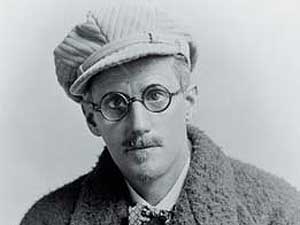|
Audio
Photos
More from MPR
Resources
Your Voice
|
Bloomsday in Dublin (and Moorhead)
June 16, 2004
 |
| Author James Joyce, 1882-1941, is considered by many to be one of the most influential authors of the 20th century. (Photo courtesy of ReJoycedublin.org) |
Moorhead, Minn. — If you're a James Joyce fan, Dublin, Ireland, is the place to be this week.
Minnesota State University, Moorhead professor and Joyce scholar Sandy Pearce is in Dublin, among some 800 literati from 32 countries, celebrating the 100th anniversary of the fictitious events Joyce described in the novel "Ulysses."
|
Joyce's legacy is huge. The regular reader ... has probably never read Joyce and is saying, 'What's all the hubbub about?' But in many ways they have read Joyce, because so many American authors were influenced by (him.)
- MSUM professor Sandy Pearce |
"It's hard to describe. It's like a whole city having a big party," says Pearce. "I guess in a way Seamus Heaney said it best. He opened by saying, 'This is a day out of Joyce's imagination, so everybody is celebrating this make-believe holiday, but it's threatening to overtake St. Patrick's Day as our national holiday.'"
When James Joyce published his story of a day in the life of Leopold Bloom in 1922, it was considered scandalous. It was declared obscene in the United States until 1933.
The novel has been called all-inclusive, because it explores every human feeling or activity imaginable. The short list includes sex, politics, parenting, death, religion, sado-masochism and xenophobia.
"It's offensive in every way," says Pearce. "It opens with this parody of the Catholic Mass. There's Buck Mulligan. He's got his bathrobe open, he's in his birthday suit, bare to the world. He's shaving and performing a mock Mass."
"Stately, plump Buck Mulligan came from the stairhead, bearing a bowl of lather on which a mirror and a razor lay crossed. A yellow dressing gown, ungirdled, was sustained gently behind him by the mild morning air. He held the bowl aloft and intoned, 'Introibo ad altare Dei.' "
For many people, "Ulysses" seems to be a book to begin -- sometimes several times -- but never finish, because the stream-of-consciousness narrative writing style tends to leave them befuddled by the time they're midway through.
But some, like John Rowell, embrace the challenge.
 | |||
"I knew of its reputation as being the most difficult novel in English in the 20th century, and I decided I was going to master it before I got out of high school. Because I'm stubborn," says Rowell.
Rowell is a postal carrier and a member of the Moorhead city council. He's also part of a small group that's been reading Ulysses aloud each week the past couple of months at the Rourke Art Museum in Moorhead, aiming to finish the tome on the 100th anniversary of the day captured within its pages.
Rowell has read Ulysses three times, which is substantial if you consider the reading requires each page to be digested several times.
His love of Ulysses is akin to his decision to pursue a bachelor of arts degree in English.
"The experience of getting a bachelor of arts in English -- no practical application -- is not much different than reading the novel "Ulysses." Again, no practical application, but in each case the rewards are infinite and last a lifetime," says Rowell.
 | |||
Practical or not, thousands of pages of criticism and praise have been written about "Ulysses."
Minnesota State University, Moorhead professor Sandy Pearce, who's at the celebratory epicenter in Dublin, thinks Joyce would throughly enjoy the efforts to comprehend and explain his novel.
"There's a real famous quote that he had enough in there, in "Ulysses," to keep the college professors busy forever. Judging by the size of these symposia I go to, and how many crazy different papers are written on his work, I'd say he was pretty prophetic," says Pearce with a chuckle.
Joyce enthusiasts in Moorhead and around the world will gather to celebrate the story of Leopold Bloom's day, and perhaps to toast the author with a drop of Irish whiskey.
|
News Headlines
|
Related Subjects
|
